If the thought of missing out on a chance to visit America’s highest peak or walk across the lowest point in North America has got you down, don’t pack away your National Parks Passport Stamp book just yet. Instead of turning your summer into a bummer, why not try pivoting your plans by visiting a smaller or less-crowded national park?
Following the coronavirus pandemic, organizations like the National Parks Conservation Association (NPCA) and the National Park Service (NPS) need people’s continued support. Still, that support shouldn’t come at the expense of people’s health. While planning upcoming trips, please make sure to recreate responsibly wherever your travels may take you. This summer, if your travels take you to a national park, consider visiting one of the top 10 smaller or less-crowded national parks instead.
The Boom in National Park Popularity
It’s true; Americans are in love with nature. What better way to spend time immersed in some of the country’s most scenic places than by staying and playing in one location? More families are taking to the open road, renting or buying RVs, and exploring the countryside from the comfort of their small homes on wheels. The ideal destination? National parks. Don’t just take our word for it. National park visitation continues to climb, with 2021 reaching a staggering number of 297,115,406 recreation visits (NPS).
What do these high visitation numbers mean for travelers? The chances are good that the larger, more popular parks will see increased visitation again this summer. People’s desire to see the national parks paired with the nation’s desire to get out of the house to see things near their own cities will likely cause a notable increase in park traffic.
Why a Smaller or Less-Crowded National Park Might Be a Better Vacation Choice
Organizations such as the NPCA promote smaller, less popular national park destinations that are often overlooked by travelers. All national parks are beautiful in their own right, and we know that once you visit some of these less-trafficked parks, you will rejoice in your decision to travel to the quieter, more-peaceful spaces within the park system.
If you like the idea of visiting a smaller, less-populated park to explore more of this beautiful country (and save some extra dollars!), get out some paper and take note of the parks that top our list of the 10 smaller national parks worth visiting this summer. Our list takes into account the parks’ locations, peak operating seasons, as well as the number of visitors these parks have seen over the last few years. It’s time to unpack your hiking gear and explore some of America’s most scenic and less-seen terrain.
The Top 10 Less-Crowded National Parks to Visit This Summer
Black Canyon of the Gunnison National Park
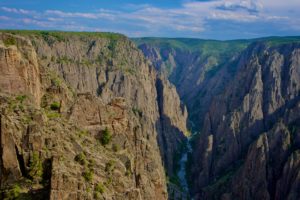
Colorado’s Black Canyon of the Gunnison is known for its steep and narrow canyon walls. The canyon, carved by the Gunnison River, attracts hikers, rock climbers, anglers, horseback riders, campers, and dark-sky viewers. If you want to avoid the crowds, head to the North Rim area instead of the more popular South Rim.
Congaree National Park

Congaree National Park, located in South Carolina, is an International Biosphere Reserve. The park’s swamps and wetlands attract birds, alligators, and other wildlife. The park is known for having the largest population of old-growth cypress trees in the world and deserves at least a day or two of quiet exploration.
Isle Royale National Park
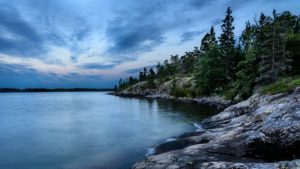
Isle Royale National Park is an International Biosphere Reserve located on an island in the middle of Lake Superior. People come to the Michigan park by seaplane or boat and spend time paddling, fishing, backpacking, and wildlife watching. If you are searching for a remote destination, this park is for you.
North Cascades National Park
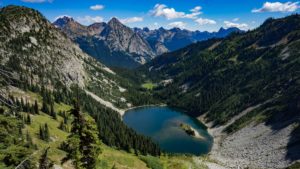
People searching for wilderness and wildlife should add Washington state’s North Cascades National Park to their must-visit list. The park, filled with glacial-topped mountain peaks and turquoise blue lakes, has a decent amount of remote areas, making it possible to explore the farthest-reaching spaces for days without seeing a soul.
Voyageurs National Park
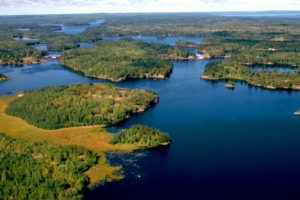
With four large lakes surrounding Voyageurs National Park, water-based activities are the top draw when visiting this Minnesota-based park. In fact, the primary means of transportation is via water. Boating, fishing, kayaking, and canoeing are some of the park’s most popular activities, but there is plenty of hiking near all of the water as well, so visitors won’t have to spend their entire trip on the water.
Great Basin National Park
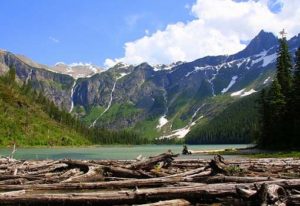
Great Basin National Park, Nevada’s only national park, is an International Dark Skies Park. This means stargazing is at the top of almost everyone’s to-do list while visiting. The park has hiking trails and scenic drives, but what brings most people to the park is the system of underground caves. If you are interested in exploring the caves, call the park for reservations.
Guadalupe Mountains National Park
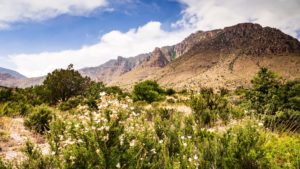
South of Carlsbad Caverns National Park, just south of the New Mexico border into Texas, is Guadalupe Mountains National Park. Guadalupe Peak has the honor of being Texas’s highest peak, yet the park’s visitation remains lower than other national parks in the area. One of the park’s main recreational draws is hiking, attracting hikers and backpackers to see this ancient fossil reef on foot.
Katmai National Park
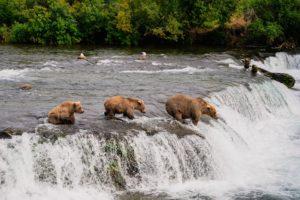
Much of Alaska’s national parks top the list of least-visited parks. Perhaps it is the size of Alaska that keeps people from exploring the far reaches of the state or simply the fact that Alaska has so much to see and explore that most parks receive less fanfare than Denali National Park. Katmai National Park is only reachable by air, but once you take a floatplane to the park, prepare yourself for the best brown bear viewing and salmon fishing in the state.
Theodore Roosevelt National Park
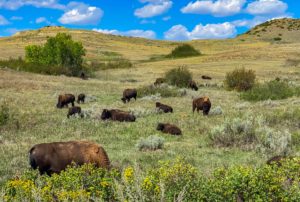
Theodore Roosevelt National Park in North Dakota is a mix of blowing grasslands and craggy North Dakota badlands. The South Unit is the most populated area, so if you want seclusion, bring an off-road, high clearance vehicle, and explore the North Unit. Stand atop the interpretive overlooks that give park guests views of the Missouri River and the rest of the incredible landscape that Teddy Roosevelt called home.
Wind Cave National Park
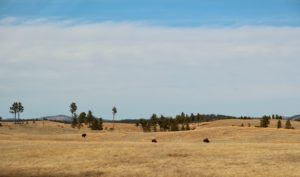
Most people go to the Black Hills of South Dakota to see Mount Rushmore or to explore Badlands National Park, but a short drive away from both locations is the lesser-visited Wind Cave National Park. Below the ground, visitors can take a guided tour of the caves. And above the ground? Prepare to see hundreds of bison, as well as deer, pronghorn, and the cutest creature, the prairie dog, whose home covers much of the park’s landscape.
Ready for Some Less-Traversed Exploration?
There’s a great deal of wilderness left to be explored, from the cold waters of Alaska and the mountain peaks of Washington to the beautiful lakes of Michigan and the arid lands of Texas. So, hop in your RV and head to one of the smaller national parks, equally as stunning as the rest, but far less crowded.









